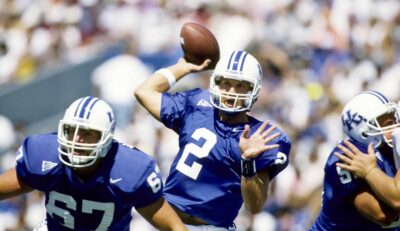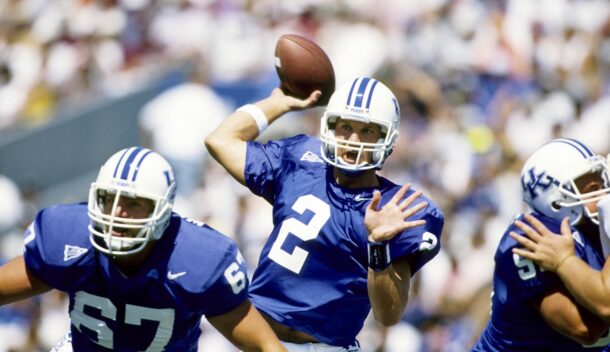
On Tennessee’s final possession Saturday against Alabama, a swarming Crimson Tide defense sacked Tennessee QB Joshua Dobbs, forcing a fumble with 1 minute and 18 seconds left in the game. Alabama recovered the fumble and went into victory formation, completing a 19-14 win over the Volunteers.
It was another tough loss for Tennessee, its ninth straight to Alabama and its fourth close loss of the season. The Vols have continued to improve as the season has progressed, but there are a few on-field influences that have led to Tennessee’s 3-4 record.
1. The offensive line has struggled in pass protection: In three of Tennessee’s losses (Oklahoma, Florida and Alabama) Dobbs was sacked a combined 11 times. Considering Tennessee’s opponents have had a tough time wrapping up and tackling Dobbs, the sacks total is alarming and indicates that he hasn’t had much time in the pocket. As a result, Dobbs struggled to complete passes (36 for 70 for 379 yards against those three opponents). The Vols have dealt with injuries on their offensive line — starting OT Brett Kendrick and OG Jason Robertson were replaced by two true freshmen, Chance Hall and Jack Jones, against Alabama — but the offensive line struggled before those injuries.
2. Dependency on Dobbs: In two of Tennessee’s wins, Dobbs rushed for a total of 207 yards (12 carries for 89 yards vs. Bowling Green and 18 carries for 118 yards vs. Georgia). In Tennessee’s loss to Florida — a game that the Volunteers had plenty of opportunities to win — Dobbs ran the ball 18 times for 136 yards. In Tennessee’s other losses, Dobbs ran the ball 37 times for a total of 38 yards (12 yards vs. Oklahoma, 7 yards vs. Arkansas and 19 yards vs. Alabama). The stats don’t lie: Tennessee’s offensive success relies on Dobbs’ ability to run the football. If he is consistently stuffed at the line of scrimmage, Tennessee has trouble moving the ball down the field.
3. Conservative defense in the fourth quarter: In the first three quarters of Tennessee’s 31-24 loss to Oklahoma, Oklahoma QB Baker Mayfield was 8-of-25 for 84 yards and two interceptions. In the fourth quarter and overtime, Mayfield was 11-of 14 for 103 yards and three TDs. The biggest difference between Mayfield’s play in the first three quarters and his play in the fourth quarter and overtime was the distance of the passes he was throwing. The average distance his passes traveled in the first three quarters was 10.8 yards. After the third quarter, that distance dropped to 2.7 yards per pass attempt. Mayfield was able to complete short passes to Sterling Shepherd and his other receivers because Tennessee’s defensive backs were not playing press coverage. As a result, Oklahoma’s receivers were able to make plays in open space and move the chains in the fourth quarter. It was also an issue in Tennessee’s loss to Florida and its narrow victory against Georgia. Tennessee was more aggressive on defense in the fourth quarter against Alabama, so its fourth-quarter defensive mentality might have changed. But so far, conservative fourth-quarter defensive play has had a great deal of influence on Tennessee’s season.
4. Missed field goals: If Aaron Medley, had made all of his field goal attempts this season, Tennessee might be undefeated. In Tennessee’s loss to Oklahoma, Medley missed a 48-yarder in the third quarter that would have given Tennessee a 17-point lead. Against Florida, Medley missed a 55-yard, game-winning field goal attempt on the last play of the game. Against Arkansas, Medley missed a 28-yarder that would have given Tennessee a 17-7 lead and kept the momentum in Tennessee’s favor. In the loss to Alabama, Medley missed three kicks – from 43 yards out and two 51-yarders. Though it’s hard to blame Medley for Tennessee’s 3-4, his missed field goals have killed Tennessee’s momentum and given opposing offenses good field position.
5. Inconsistent pass rush: In Tennessee’s loss to Alabama, The Vols’ defensive line proved that it could dominate. The pass rush was the main reason why Tennessee hung tough with Alabama. The defense sacked Jake Coker five times and forced the Alabama QB to make a few poor decisions. If the defensive line can dominate one of the best offensive lines in the country, it should make a difference in Tennessee’s final five games.
Chase Erickson is a contributing writer for SDS. He covers Tennessee. Follow him on Twitter @ChaseDownField.







